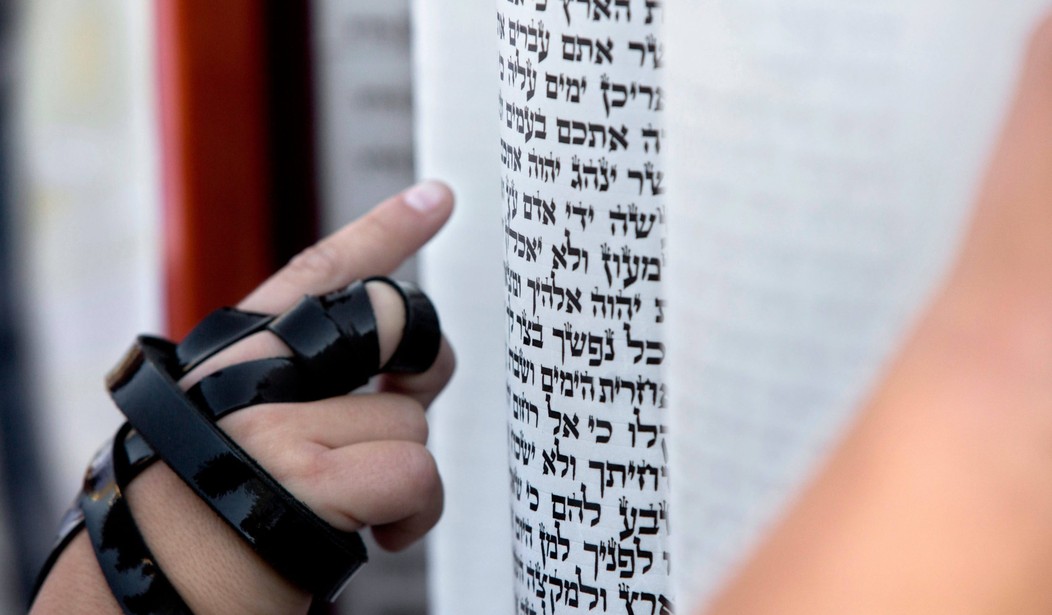These essays follow the annual cycle of Torah readings in synagogues the world over, and provide a taste of rabbinical exposition of each such reading in the week it occurs. For a fuller appreciation of the background and underlying premises, please click here.
Dëvar Torah – Parashath Shëmoth (Exodus I,1-VI,1)
This week’s parasha begins with the second book of the written Torah, Exodus. The book’s common Hebrew name, Shëmoth (“Names”), is derived from the first significant word in the first verse, as is the case with the names of the other books. Interestingly, the author of the early codification of Jewish laws known as the Halachoth Gëdoloth (“Great Laws” — the author is known only as the ba‘al Halachoth Gëdoloth or Bëhag, according to the initials), in enumerating the books of the written Torah, calls Exodus Chumash Shéni, i.e. the second book of the five, whereas he calls the other four by name.
Rabbi Naftali Tzëvi Yëhuda Berlin, in his Ha‘améq Davar, suggests that the Bëhag considered Shëmoth to be a sort of companion volume to Genesis, in that it tells of the completion of Creation. The Talmud (‘Avoda Zara 3a) tells us that at the beginning “the Holy One, Blessed is He, made a condition with Creation: If Israel accepts the Torah, good; and if not, I shall return you to chaos.” Thus the entire point and purpose of Creation was to establish a venue in which the earning of rewards for learning and observing the ethical conduct taught by the Torah is relevant. Hence, Shëmoth, which relates the story of the emergence of the “kingdom of priests and holy nation” (Exodus XIX,6) who would be the bearers of Torah in the world and the source of light to all its nations, is properly viewed as the conclusion and completion of Creation, “volume II” of the story which began in Genesis.
The midrash (Bëréshith Rabba I,2) informs us that the Torah is the blueprint according to which the world was designed. That being said, it must also be remembered that rewards are granted according to the effort or struggle involved, as the mishna in Avoth V.21 tells us: Lëfum tza‘ara agra, “according to the suffering is the reward.” It is against this background that the drama of the Egyptian exile, the oppression and enslavement of Israel, and Israel’s redemption from Egypt, are to be understood.
The parasha’s first verse reads: “And these are the names of the sons of Israel who were coming to Egypt with Ya‘aqov…” The usage of Bënei Yisra’él — “sons of Israel” — on the one hand and “Ya‘aqov” on the other is striking and seems unnecessary since Yisra’él and Ya‘aqov are two names for the same person. The verse could instead read “…who were coming to Egypt with him…” So why is it worded in this way?
As was discussed in the essay on parashath Vayishlach, Yisra’él is the shém hama‘la, Israel triumphant, living up to the expectations of its Father in Heaven. Accordingly, the 15th century Italian Rabbi ‘Ovadya Sforno notes that each of the original exiles in Egypt was a tzaddiq, a righteous and holy individual in his own right, “and these men were luminaries as long as they lived, and so the generation did not deteriorate.” Their descendants and students looked up to them, respected them, and listened to them. The Sforno goes on to say, however, that while there were tzaddiqim in subsequent generations as well, they were of lesser import and their contemporaries accorded them less attention. It is for this reason, presumably, that the Séder ‘Olam Rabba, the primary traditional source dating the events of Jewish history, sees the beginning of the Egyptian oppression as contemporaneous with the death of Lévi, last of the original brothers, in the year 2338 since the advent of the first adam (we are currently in the year 5776).
During their first century in Egypt, living isolated in Goshen under the guidance of the tzaddiqim, Israelites thrived and multiplied. However, the Sforno sees in the word vayishrëtzu, “and they multiplied,” in verse 6 a hint at the downfall that was to come: “And after all seventy of the souls died, they tended toward the ways of creeping things [shëratzim], creeping toward the pit of corruption.”
Accordingly, “there arose a new king over Egypt who did not know Yoséf…” The Talmud (Sota 11a) records two opinions as to what happened: chadash mamash, i.e. there was literally a new king, or shenithchaddëshu gëzeirothav, implying that he may have been the same king. Regardless, he demonstrated his ingratitude by issuing anti-Semitic decrees. The Midrash Tanchuma on our parasha records a tradition that it was the Egyptian nobles, motivated by lust, who demanded that the king do away with all the Israelite males in order that they might have the females. Pharaoh protested that he could not do that to the family of the great Yoséf, and so they deposed him for three months until he agreed to the task.
The “new” king then announced his intentions in terms which have inspired anti-Semites down through the ages: “Look, the bënei Yisra’él people are more numerous and stronger than we are. Let us outsmart them, lest they become many and when a war occurs they will be added to our enemies and will fight against us and leave the country;” (I,9-10). The argument is irrational: first, he declares that the bënei Yisra’él are already “numerous and strong,” but they have to be outwitted lest they become so. They are represented as a potential “fifth column” in the event of war, but again have to be outwitted lest they leave the country (at which point the alleged internal threat would presumably vanish).
There is another problem with this already problematic text: my translation follows Onqëlos’ Aramaic paraphrase, but an examination of the Hebrew original reveals that all of the third-person plurals in the translation are actually singulars. This fact was not lost on the Sages of the Talmud, who asked: “‘Let us out-smart him?!’ It should read, ‘them!’” (Sota, ibid.), prompting one of them to propose that Pharaoh’s actual meaning was, “Come, let us out-smart the Savior of Israel,” i.e. G-d. What could that mean? Does it help us understand what underlies Pharaoh’s argument?
The common view of Egypt’s enslavement of the bënei Yisra’él as centuries of unrelieved horror is distorted. The Talmud (Pësachim 39b, Yërushalmi Pësachim II,5) tells us that the beginning of the process was sweet and mild. The Egyptians coaxed the bënei Yisra’él out of Goshen, offering them high rank and princely remuneration to settle elsewhere in Egypt. It was precisely this which Yoséf sought to avoid by settling his family in Goshen. Yoséf knew that his Pharaoh would wish to employ them in his service and assimilate them in Egypt by offering them the best of the land of Egypt (cf. Genesis XLV,18).
It would seem that he – more correctly, his successors – had now succeeded in this original Egyptian policy goal. Indeed, Torah sources tell us that the Egyptians succeeded only too well: by the time of the redemption from the Egyptian exile, only a remnant of the bënei Yisra’él remained to leave; many had died under the plague of darkness, so as not to give the Egyptians the satisfaction of seeing them perish (cf. Shëmoth Rabba XIV, 3), so “Egyptianized” had they become.
So the fact is that, as a matter of deliberate policy, Pharaoh had aided and cajoled the bënei Yisra’él in acclimating themselves to Egypt and Egyptian culture, and now was suddenly in a blind, irrational panic concerning the “Jewish peril”; why?
To want to be accepted, to be “normal,” to “fit in,” to “be like everybody else” is a very natural human urge. But the story of Israel from the very beginning is that of a bloodline deliberately distinguished from the rest of mankind, a “people dwelling apart and not counted among the nations” (Numbers XXIII,9). The conflict between these two realities is a large part of the tza‘ara which Israel bears for the agra of being the “kingdom of priests and holy nation,” the Torah-nation.
The world finds this very unsettling as well. The nations would love to absorb Israel, to assimilate them, to rid themselves of this disturbing foreign body in their midst with their insistence on a Torah of justice, kindness, and decency. Hitler reveled in the title of “barbarian” and told his friend Hermann Rauschning before the war that his chief ambition was to rid the world of that “Jewish invention,” the human conscience (H. Rauschning, The Voice of Destruction, pp. 237-242).
The Egyptians, the “earthiest” of the people of antiquity, wished to “outsmart” G-d, to prevent the Divine revelation destined to occur at Sinai (albeit unconsciously), because it would show them what they were: petty, vain hedonists, and spiritually barren despite their impressive knowledge of natural science and technology. Even Israel in embryo, before the giving of the Torah, was too bitter a pill for the Egyptians to swallow. The profound discomfort which they caused themselves by trying to assimilate the inassimilable caused them to see Israel as a threat to their materialistic culture — people whom they wished to hold down to earth, lest vë-‘ala min ha’aretz, “he will ascend from the Earth” (the literal meaning of the last clause in verse 10 quoted above), lest Israel realize their spiritual potential, rise above materialism, and infuse the Earth with the spirituality of Torah.
This is the nature of the struggle into which the bënei Yisra’él and Egypt entered. And this is why every anti-Semitic régime in history has merely been a reprise of Pharaoh’s speech.









Join the conversation as a VIP Member